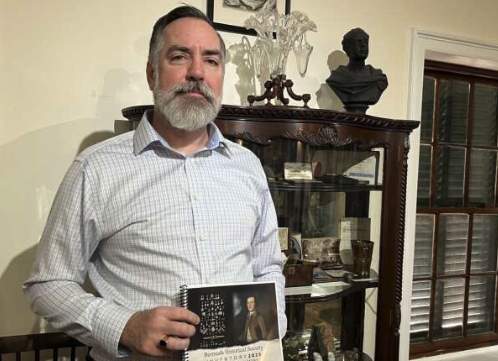 Sean Morris deep dives into Island's past
Sean Morris deep dives into Island's pastOur good friend and former colleague, retired Sgt. Sean Morris made headlines in the Royal Gazette this morning (7th November 2025) after “A painstaking deep dive into the Island ‘s past (which) has yielded an inventory of curiosities for the Bermuda Historical Society Musem, where close to 90% of items have been recorded by volunteer and retired police sergeant, Sean Morris.” Illustrated with photographs, the updated catalogue marks the first accounting of the society’s artefacts at its museum in Hamilton since 1992.
“The job took him more than two years delving into centuries of items, from silverware, paintings, china, furniture and coins to police memorabilia and relics from prisoners of the Boer War.
“Sean says his labour of love identifying the exhibit pieces and incorporating the fresh additions came with some surprises.
“Sean goes on to say, ‘There are some police items, including a cigarette case and a medal given to Albert Rogerson, a police officer who was badly injured in 1921 and received a medal for gallantry.’
“I’m interested in police and military history, so that one stands out to me.”
“History records that Mr Rogerson was on patrol during an era when the east end of Reid Street was a notoriously rough area of Hamilton.
“He arrested a man after encountering a fight in Fagan’s Alley. The man attacked him and was joined by a group armed with sticks and bottles, who beat the officer and dragged him towards Front Street while he maintained a grip on his intended detainee. Mr Rogerson’s injuries included getting slashed with a razor, and his left hand was left almost useless.
"He returned to England and was awarded the King's Police Medal for Gallantry by King George V. Mr Rogerson ultimately returned to Bermuda, married and remained on the island.”
CLICK HERE to view the full article in the Royal Gazette.
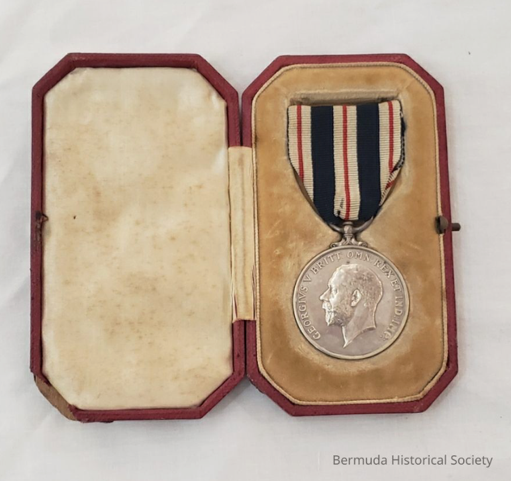 King's Police Medal for Gallantry
King's Police Medal for GallantryIf the story of Albert Rogerson sounds familiar to our ExPo readers, it’s probably because the attack on Constable Rogers is mentioned specifically in an article on our ExPo website when Roger Sherratt gave a talk on the History of the Bermuda Police during Police Week in 2014, CLICK HERE to view the article on our ExPo website. P.C. Albert Rogerson was a member of the first group of overseas recruits who arrived in Bermuda on a hot day in August 1920.
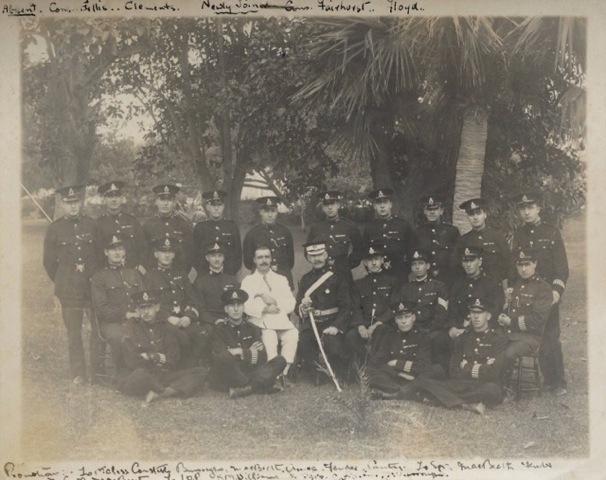
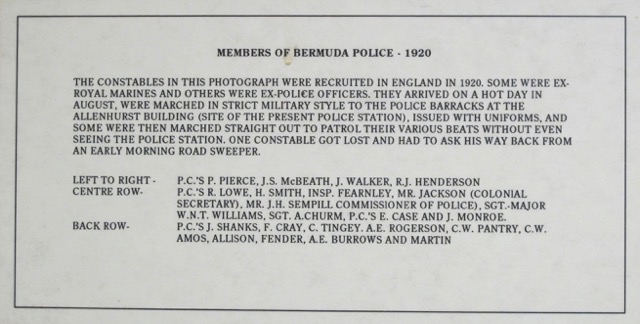 Photo and caption from Police files
Photo and caption from Police files
Retired Superintendent Andrew Bermingham is head of the Bermuda Historical Society and has been an active member of the society for many years. Andrew says, “Sean has put two years of very hard work into this project, and has the necessary skills, including the ability to be precise and have the essential accuracy to pull together this superb book which captures some 80% of the BHS inventory. Together with support from Pro Service with Glen Phillips and his team we now have a wonderful record of our exhibits.”
Copies of the inventory book went on sale earlier this month, and you can CLICK HERE to view it online.
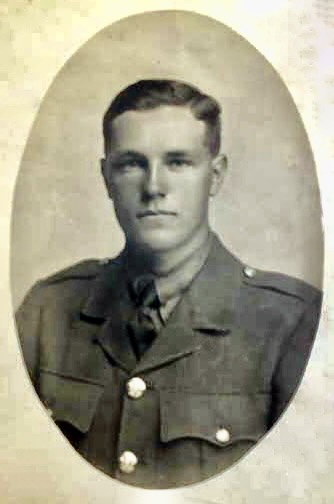 2nd Lt. Albert Edward Rogerson
2nd Lt. Albert Edward RogersonAdditional information about Albert Edward Rogerson
Shortly after we published the above article about Sean’s two year project in cataloguing the inventory of the Bermuda Historical Society’s collection, we received the following additional information from Sean about the history of Albert Rogerson who was awarded the King’s Police Medal for Bravery as a result of his action in making that arrest even though badly injured during the altercation.
Sean discovered the above photo of Albert Rogerson taken when he was serving in the Argyll and Sutherland Highlanders
Born in Wakefield, England, on 20th May 1884, Albert came from Scottish ancestry and his home was at Grangemouth in Scotland. During the First World War he served overseas, being a Second-Lieutenant in the Argyll and Sutherland Highlanders when hositilities ceased in 1918.
Albert came to Bermuda with the first batch of recruits from the UK on 9th August 1920 when then Poilce Chief Semphill completely reorganised the Force, bringing out a number of Englishmen and Scotsmen including Mr. J.S McBeath who went on to become Commissioner of Police.
After being invalided out of the Force in 1921 due to his severe injuries, Albert served for a time as manager of the Riddell’s Bay Golf Club, later becoming chief steward at the Belmont Manor Hotel. He later worked in the Customs Department, first as an Extra Revenue Officer, and latterly as a Civil Servant on the airport section of the Customs staff.
Although not officially affiliated with any Bermuda Lodge, Mr. Rogerson had been a Freemason since 1919, his mother-Lodge being Zetland, No. 291 of Grangemouth, and while in Bermuda he was a regular attendee at the meetings of Atlantic Phoenix Lodge in Hamilton.
Sean discovered that Albert used to reside at “Swansea” on Harbour Road, and Sean recently visited the house which now happens to be owned by one of his own relatives. It wasn’t lost on Sean that Albert Rogerson had lived there many years ago.
Albert died here in Bermuda in 1946, at the age of 52 and was buried at St Mary’s Churchyard although there are no records to indicate as to which grave. Pall bearers for the funeral were Police Superintendents Charles W Pantry and George Smith, along with Messrs Harry Smith and Jack Critchley of the Bermuda War Veterans Association, and Messrs Ralph Gauntlett and Frank Crisson of the Customs Department.
During his enquiries about Albert Rogerson, Sean discovered a letter written by J.H Sempill, Chief of Police, who wrote to His Excellency the Governor about the “highly creditable manner in which Constable Rogerson acquitted himself. Rogerson in performing his duties appears to have displayed the utmost courage and tenacity of purpose” It was no doubt this letter to the Governor that resulted in Constable Rogerson being awarded the King’s Police Medal for Bravery signed by King George V.
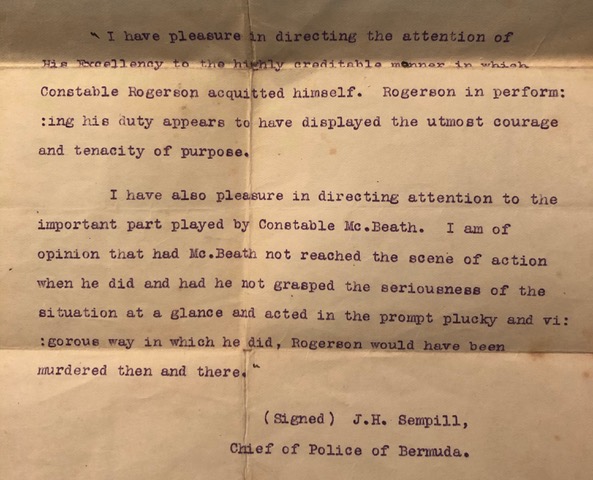
In the same letter Commissioner Sempill “took pleasure in direting attention to the important part played by Constable McBeath. He further wrote, “I am of the opinion that had McBeath not reached the scene of action when he did and had he not grasped the seriousness of the situation at a glance and acted in the promt and vigorous way in which he did, Rogerson would have been murdered then and there.”
By coincidence, Constable John Strang McBeath who went on to become Police Commissioner, married Saun’s great-grand-aunt, Elsie Gauntlett. It’s a small world!
Editors note - In 2O20 we published comprehensive article written by George Rose about Chief of Police, J.H. Sempill, which can be viewed in our “Hall of Fame” column. At that time we did not have a photo of Albert Rogerson so we have now added his photo, to the article along with additional information about the circumstances surrounding the incident which resulted in P.C. Rogerson being awarded his bravery medal.
Sadly, the “Hall of Fame” also describes the tragic circumstances of the death of J.H. Sempill who had left Bermuda in 1927 following 12 years of outstanding service in the Bermuda Police to take the position of Superintendent of Police in British Honduras. Mr. Sempill lost his life when he drowned during a deadly Category 4 hurricene which struck British Honduras resulting in severe damage and the loss of some 2,500 lives. CLICK HERE to view our “Hall of Fame” article about John Howard Sempill.
13th November 2025